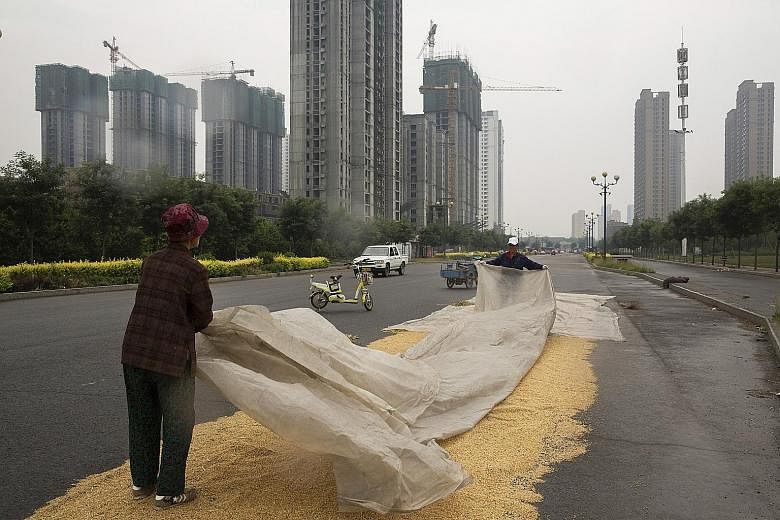BAODING (China) • The famed clothing market's vast new home is ready for business.
Hulking new buildings that will house vendors selling furs from Inner Mongolia, cashmere from Tibet and textiles from the coast look like spaceships that have landed in the surrounding corn and millet fields.
For now, the buildings lie empty, but planners say they are the first steps in the latest effort to modernise Baoding, a city of about 1 million south-west of Beijing.
Baoding has also signed over two high-rises to a company that runs the Zhongguancun high-tech district in Beijing in a bid to fill it with tech firms. A high-speed rail line from Tianjin is expected to open this year. The city has also created an industrial park for companies that produce solar panels.

Until now, Baoding's main distinctions were having the most polluted air in China, and losing its status as the provincial capital during a power struggle in Maoist China.
But now it hopes for a different image - that of a prosperous satellite city of 130 million that will give poorer north China the economic engines that have powered central and southern China along the Yangtze and Pearl River deltas.
Called Jing-Jin-Ji after its three key centres - "Jing" is for Beijing, "Jin" is for the port city of Tianjin, and "Ji" is the traditional name for Hebei province - it aims to move away from the dirty industries common in Hebei and towards the information industries found in Beijing.
"This is a chance for Baoding to recapture some of its former importance," said the city's official historian Sun Jinzhu. "This is a historic opportunity for us and for the rest of Hebei."
But transforming Baoding will be a challenge. The region has few natural economic advantages beyond coal mining, leading to the development of the world's biggest concentration of heavily polluting coking and steel factories.
Even though Baoding itself has no heavy industries, pollution from nearby cities has given it the worst air in China.
The risks of such down-market economic development are also apparent in nearby Tianjin, which became a centre for dirty chemical industries rejected in many other parts of China. Last month, a massive chemical fire destroyed part of Tianjin's Binhai New Area port, one of the pillars of the Jing-Jin-Ji plan.
The effort to redeem Baoding has echoes in the past. A key military and political stronghold in imperial China, Baoding was famed for its dates, persimmons and sesame oil. But the Communists, who took power in 1949, favoured heavy industry.
"They said that Baoding couldn't be the provincial capital because it had no industry," Mr Sun said.
Planners now hope to fix Baoding's economic deficits, through infrastructure and powerful administrative structures which would push industry out of Beijing and into Baoding. A key step came in May when China's state council approved Baoding's expansion from 310 sq km to 2,200 sq km, or nearly three times the size of New York City.
The approval increased Baoding's real estate prices, with speculators hoping that the government would move some ministries there. While it did not, Beijing pledged to move its famous wholesale clothing market in Dahongmen to Baoding.
So far the infrastructure is in place, but other progress is stalled. A new home for the Dahongmen market has been built in Baoding but only a few stores are open. Retailers said they had moved because Baoding was their hometown.
More sceptical are local economists like Mr Deng Zhengxin of Hebei University in Baoding.
Mr Deng said the urban conglomerates along the Yangtze and Pearl Rivers had grown naturally because their key cities of Shanghai, Guangzhou and Shenzhen had the economic need to move businesses out of their urban centres and into the hinterlands.
What is lacking in north China is a similar economic centre. Beijing is a locus of political power, leaving few opportunities for cities like Baoding to benefit from the supercity policy.
"What does Beijing have to give Baoding?" Mr Deng asked. "Its main product is politics. How do you share that with other cities?"
NEW YORK TIMES

